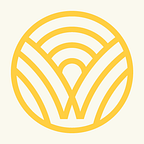In Community
by Rebecca Estock, 2020 ESD 123 Regional Teacher of the Year
Editor’s Note: This is part of a series of articles written by 2020 Washington Regional Teachers of the Year about their strategies and reflections on teaching during COVID-19 school facility closures. See the rest of the series.
Many years ago when I was starting a new teaching job, and everything around me was new, I decided to end every day with a list of things I had learned. The problem with my self-imposed growth plan appeared some two weeks later. Overwhelmed by exhaustion and feeling defeated, I looked at the list that was now over 100 learning points long. Rather than being inspired and motivated, I felt like a failure. In an environment, where I was supposed to know what I was doing and how to do it well, I was coming up short.
The road ahead felt too long, so I took down the list and threw it away. I determined that the greatest learning tools I had existed within my own community. I began reaching out to colleagues, communicating about my needs, and seeking feedback from trusted resources. I learned that gaining understanding within a community is better than learning in solitude, and collaboration is always more powerful than isolation.
This spring I was visiting with a family struggling to navigate the world of learning at home. For this family, and so many others, school at home via technology and learning packets is a new and uncomfortable world. This kind mother, who is working full time and providing care for her several small children, was overwhelmed and exhausted. She too had created a long list of things she was learning, which was slowly transforming into a list of her personal failures.
My heart was full of empathy and a desire to ease her heavy load. As I considered both her needs and those of her family, we determined some mini lessons would help her get the skills she needed to support her students. Tutorials on connecting with teachers and using Zoom were top priority. Next I showed her how common household games like Uno and Pictionary could meet learning standards. We discussed how much time a week spent on schoolwork was reasonable for her family and what format they needed in order to learn. In the end, I got to see her smile, hear her children laugh, and feel the heavy weight of potential failure lifted. As I left each visit, I heard her say, “gracias, maestra,” and I felt the pleasure of being a part of my community.
Certainly, at this unprecedented time, each of us have experienced a “first” at some level that has made it necessary for us to demonstrate compassion, care, and commitment to human wellness; to care for our community first. This is especially true in our homes or classrooms. The positive attributes that we possess are being challenged as we seek to be better parents, teachers, learners, and leaders.
Ultimately, as part of a community, we are learning how to view human needs through a different lens and as a result, we are redefining what it looks like to have a quality education. In a community, a quality education means that we actively seek for opportunities to collaborate, clarify, and communicate. As we look to elevate education, we must consider that in a world centered on academic accomplishment and scholastic superiority, we have come face to face with the reality that education must also include, and place at the forefront of decision making, the human needs that are before us.
I can see human needs are being met in our unique communities in a hundred different ways. Consider for a moment, the struggles we have overcome. Among the things that I have come to love in this uncertain time is seeing the many food service workers who provide meals and a friendly wave to families. Endless Zoom meetings have been tiring, but they have also allowed me to meet new colleagues from all over the state and have personal check-ins with my students’ families at home. I have witnessed the tremendous determination of my colleagues, and I feel excited to be an educator at this time.
The challenges we have experienced will likely become the catalyst for growth. I am eager to see what might emerge when school resumes in the fall. I know we will continue to hold excellence at the center of our work. But we must remember, school will be different and there will be adjustments. We are learners in this new reality, and that is difficult. However, in this dynamic, ever-changing world, we should remember the power of community. If we focus on working together, we will overcome the present barriers and spur needed growth for ourselves and our students. This pandemic has taught us that our community is larger than the walls of our homes, the walls of our schools, and our city boundaries. Our community can be anywhere if we allow it, and it can extend its reach to support the needs of families and students wherever they may be. Together we will step forward emerging from struggles of the past, prepared and equipped for even greater excellence in the future.
